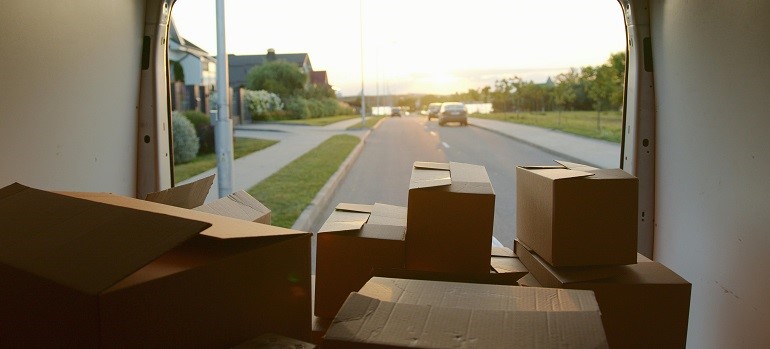Parking rules in San Francisco are strict, space is limited, and fines are expensive. A successful move requires understanding city laws, applying for permits, and coordinating timing carefully. Without planning, trucks can get tickets, towed, or delayed. Make sure you know everything you need to know about handling parking when relocating within San Francisco. From temporary permits to street cleaning schedules, every detail matters. If you are hiring apartment movers in San Francisco, permits might still be required. Manage parking challenges when moving apartments in San Francisco.
Understand the rules that affect moving trucks
Parking in San Francisco follows detailed rules that can easily catch people off guard. Large moving trucks cannot park in:
- red zones
- bike lane
- bus stops
Blocking fire hydrants, crosswalks, or driveways can result in fines or towing. In addition, the daylighting law bans parking within 20 feet of most intersections. Street cleaning is also heavily enforced, with clear schedules on posted signs. Movers often face added challenges in residential parking permit (RPP) areas. These zones limit street parking to residents with valid permits. Trucks parked in these areas without proper permission risk penalties. For moves that involve delicate valuables, working with art movers in San Francisco helps ensure items are protected even when parking is limited. Enforcement officers are active daily, and fines add up quickly. Reviewing SFMTA parking rules before moving day saves time, stress, and money.
Secure a temporary moving permit
Most relocations in San Francisco require a temporary moving permit. The San Francisco Municipal Transportation Agency (SFMTA) issues these permits for reserved curb space. Without one, parking a truck in busy areas is almost impossible. Costs depend on location and number of signs requested. For unmetered areas, you pay a base fee for several posted signs. For metered streets, you also pay per meter per day. These fees increase yearly but remain cheaper than multiple parking tickets.

Some moves require two permits—one for pickup and one for delivery. You must also consider truck size when applying. Larger trucks often require three or four parking spaces. Working with professional Bay Area movers ensures trucks meet city requirements. The city calculates this by truck length, which must be included in the permit request. Permits not only secure space but also protect movers from ticketing.
Apply at the right time and post correctly
Timing is critical when applying for temporary no-parking permits in San Francisco. Applications should be filed at least five to seven business days in advance. Once approved, the city requires signs to be posted correctly. For unmetered areas, signs must be up 72 hours before moving day. For metered spaces, signs must be up at least 24 hours in advance. Failure to follow these posting rules makes the permit invalid. Signs also must be:
- visible
- secured
- placed exactly where trucks will park.
It is helpful to take photos of posted signs as proof. If your moving date changes, you can cancel or modify permits. Requests for changes must be made within 24 hours of approval. For people who need extra flexibility, combining moving permits with storage units in Bay Area can help manage timing. Posting correctly ensures that your reserved curb space is legal and enforceable.
Provide truck measurements when applying for permits
San Francisco requires the exact truck length when you apply for temporary moving permits. The city uses this measurement to calculate how many feet of curb space you need. Most permits include up to 120 feet of signage for a flat rate, and beyond that, fees increase. Standard box trucks used for local moves often measure 30 feet or more, especially when including loading ramps. Since a typical parallel parking space runs about 19 to 20 feet, this usually means you’ll need three to four spaces to accommodate the truck safely.

Measuring accurately helps avoid permit errors and ensures you receive enough temporary “no parking” signage. If you understate your truck’s length, you might end up with insufficient space and risk a denied application or fines on moving day. To measure correctly, measure bumper-to-bumper, including any lift gates or ramps. Double-check your truck length with your moving company or rental provider before starting the permit process. A precise measurement reduces stress and protects against delays or permit issues.
Coordinate with movers and property managers
Working with movers and property managers is just as important as securing permits. Many moving companies in San Francisco know the permit system well. Some even apply for permits on behalf of their customers. However, not every company includes this service, so ask early. Your building may also have loading dock or service elevator rules. Property managers can reserve internal loading areas or notify neighbors. This coordination helps avoid blocked hallways, crowded lobbies, or elevator conflicts.
If the move comes up quickly, hiring last minute movers in San Francisco ensures professionals handle details fast. In cases where trucks cannot park directly in front, movers must carry items further. These “long-carry” moves often result in extra charges. Confirming building and truck access avoids delays and surprises. Good communication keeps everyone aligned and ensures that both property and vehicles remain safe.
Choose the best day and time for parking success
Not every day or time in San Francisco is suitable for moving. Weekday mornings are usually the best option for finding available curb space. Traffic is lighter, and parking enforcement is more predictable. Weekends bring more congestion and higher competition for street parking. Large city events, parades, or festivals make parking nearly impossible in certain neighborhoods. The SFMTA calendar lists road closures and major events in advance. Moving during these times should be avoided.

Street sweeping is another factor that complicates moves. Trucks parked during cleaning hours can still get ticketed even with permits. Choosing early morning slots allows trucks to secure space before traffic increases. For flexible planning, many people rely on local movers in San Francisco Bay Area, who know the best moving times. Checking both weather forecasts and parking calendars reduces risks. Planning your move around city schedules increases success.
Budget for parking costs in San Francisco
Budgeting for parking is an important part of moving costs in San Francisco.
- Temporary moving permits can cost hundreds of dollars depending on size and location.
- Metered zones require additional daily fees per meter
- If trucks cannot park near your building, movers charge long-carry fees. Extra labor and equipment may increase the total bill.
- Tickets also add unexpected expenses, sometimes costing more than the permits themselves. Parking tickets range from $70 to over $100 per violation. If you receive one unfairly, you can file an appeal through SFMTA. Appeals require evidence such as photos of permits and signage.
- Delays from lack of parking can also add to hourly moving charges.
Explore short-term and residential parking permits
Residential parking permit zones (RPP) are common in affordable neighborhoods in San Francisco. When moving to a new RPP zone, you must apply for a new permit. Permits are not transferable between addresses.
- A temporary VIN-based permit covers up to 90 days while you update documents.
- Short-term RPP permits are also available for movers and visitors. These can be purchased for single days or multiple weeks depending on need.
- One-day permits cost less, while two-to-eight-week permits cost more.
These short-term options are especially useful during relocations. Applications for short-term permits should be submitted at least three weeks in advance if mailing. Having the right RPP permit prevents fines after settling into your new apartment. When you start to settle into your new San Francisco home, updating parking permits quickly is essential. Always confirm your eligibility and required documents before applying.
Avoid illegal and risky parking tactics
Some people try to block spaces with cones or chairs during moves. In San Francisco, this practice is illegal. Only official SFMTA-issued no-parking signs are recognized. Using personal items to reserve space risks fines and neighbor complaints, and The Department of Public Works handles enforcement against unauthorized space blocking. Trucks parked without valid permits may be ticketed or even towed. Fines quickly become more expensive than the proper permits.

Avoiding these shortcuts keeps your move legal and less stressful. Legal alternatives include reserving space with approved signage or arranging access with property managers. Movers can also suggest safe parking approaches based on neighborhood rules. Sticking to approved methods avoids unnecessary conflicts and costly penalties. Following city rules ensures your move proceeds smoothly without drawing unwanted enforcement attention.
Know what to do if your truck gets towed
San Francisco enforces towing when trucks park illegally. Act quickly to limit costs. Storage fees accrue daily after the first few hours. Step-by-step actions to take:
- Call City Impound at 415-865-8200 immediately.
- Search your vehicle online via the contractor portal.
- Go to 450 7th Street to pay and release the truck.
- Bring ID, proof of ownership, and permit documents.
- Pay tow, administrative, and any storage fees.
- Photograph the posted signs and your permits.
- If funds are an issue, ask about low-income discounts.
- Schedule a tow hearing within 30 days if disputing.
- If SFPD ordered the tow, contact the STOP unit.
Expect the administrative fee plus the tow fee. Current schedules list $313–$370 administrative, $305 tow, and $66 for the first day of storage for light-duty vehicles, with daily storage after that. Hearings can be written or remote, and you may request a 48-hour hearing if the vehicle remains impounded and you cannot pay. Payment must be in person; cards and cash are accepted. Prevent tows by parking only where city signs or your permits allow.
Use tools and apps to make moving day easier
Technology can help when parking during a move in San Francisco. The SFpark app provides real-time data about available street parking. This app also tracks metered spaces and parking restrictions in specific neighborhoods. The PayByPhone app allows you to manage meter payments without leaving the truck. These tools are helpful when backup parking is needed on moving day.

Apps also provide alerts for time limits and meter expirations. Although permits remain essential, apps help avoid last-minute surprises. Combining permits with smart parking tools gives movers more control. Movers and residents both benefit from this digital support. Using apps to track availability and restrictions adds flexibility to the moving process. This preparation makes dealing with city parking much easier on relocation day.
Overcome parking challenges when moving apartments in San Francisco with ease
Parking in San Francisco is challenging, but the right preparation makes relocation possible. Understanding city rules, applying for permits, and posting signs correctly are essential steps. Working with movers, planning timing, and budgeting costs all reduce risks. Avoiding illegal parking tactics and using city-approved methods keeps everything safe and legal. Extra tools like SFpark and PayByPhone improve flexibility when needed. Every detail contributes to a smoother relocation experience. Planning carefully ensures trucks, movers, and residents avoid unnecessary costs or delays. If you are preparing to relocate, follow these guidelines for best results. Always plan ahead and coordinate every step with movers and managers. Careful preparation is the only way to manage parking challenges when moving apartments in San Francisco.
Tags
Subscribe to Upline Moving's Blog










